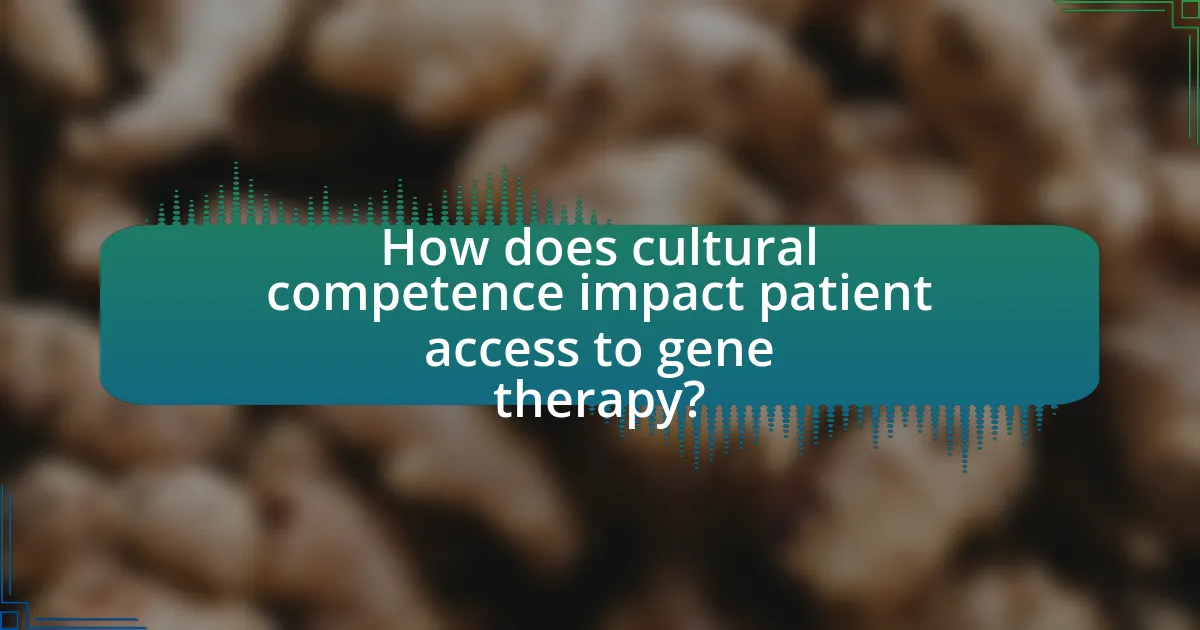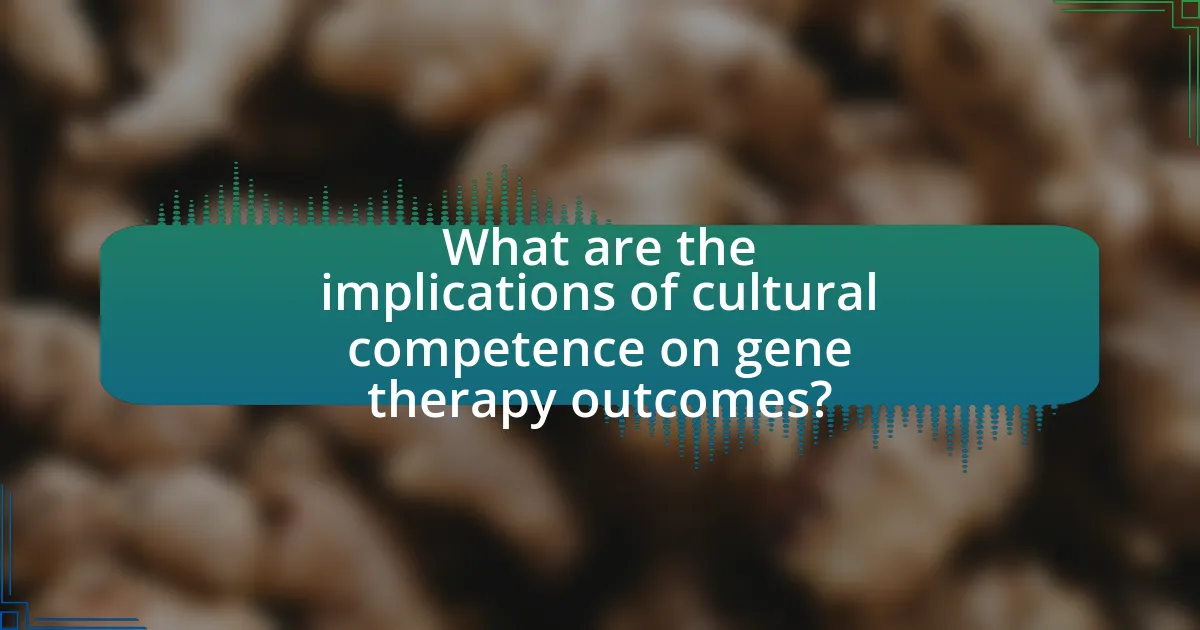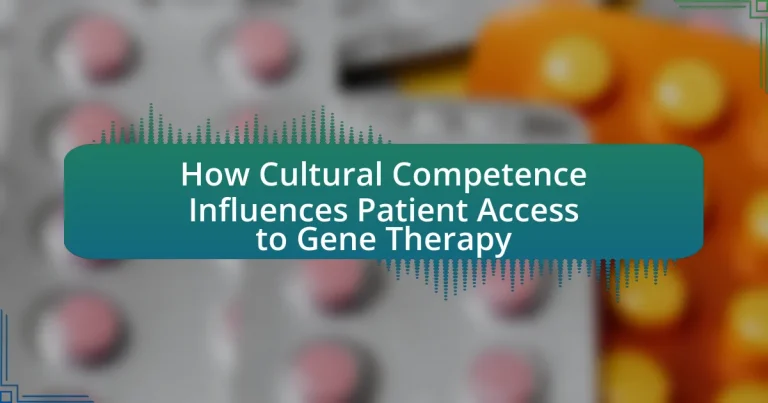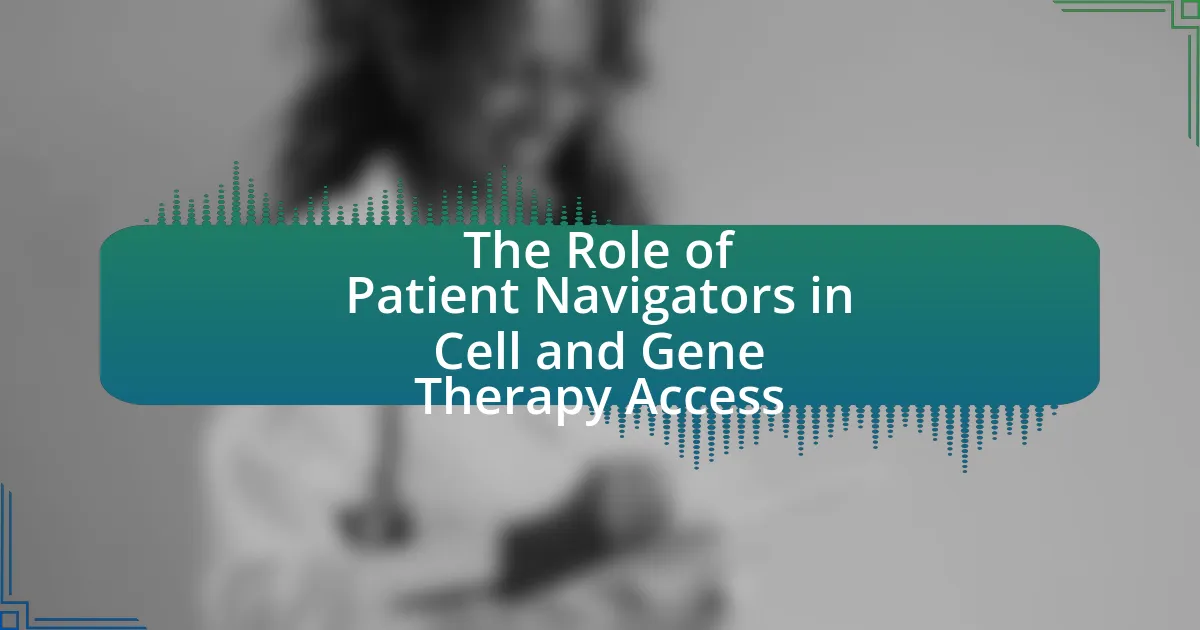Cultural competence is a critical factor influencing patient access to gene therapy, as it enhances communication and trust between healthcare providers and diverse patient populations. The article explores how understanding and respecting cultural differences can lead to improved patient engagement, reduced health disparities, and better treatment outcomes. It discusses the definition of cultural competence in healthcare, its importance for effective patient-provider communication, and the barriers patients face in accessing gene therapy. Additionally, the article highlights the role of training programs in enhancing cultural competence among healthcare providers and the long-term benefits of integrating cultural sensitivity into healthcare practices.

How does cultural competence impact patient access to gene therapy?
Cultural competence significantly impacts patient access to gene therapy by enhancing communication and trust between healthcare providers and diverse patient populations. When healthcare professionals understand and respect cultural differences, they are more likely to engage patients effectively, leading to increased awareness and acceptance of gene therapy options. Studies indicate that culturally competent care can reduce health disparities; for instance, a report from the National Institutes of Health highlights that patients from minority backgrounds are more likely to seek treatment when they feel understood and valued by their providers. This improved access is crucial, as gene therapy often requires informed consent and patient education, which are facilitated by culturally sensitive approaches.
What is cultural competence in healthcare?
Cultural competence in healthcare refers to the ability of healthcare providers to understand, communicate with, and effectively interact with patients from diverse cultural backgrounds. This competence is essential for delivering high-quality care, as it enables providers to recognize and respect cultural differences that may affect health beliefs, practices, and patient-provider interactions. Research indicates that culturally competent care can lead to improved patient satisfaction, adherence to treatment, and health outcomes, as evidenced by a study published in the Journal of General Internal Medicine, which found that culturally tailored interventions significantly improved health outcomes among minority populations.
How is cultural competence defined in the context of healthcare?
Cultural competence in healthcare is defined as the ability of healthcare providers to understand, communicate with, and effectively interact with patients from diverse cultural backgrounds. This competence involves recognizing and respecting cultural differences, which can influence health beliefs, practices, and patient-provider interactions. Research indicates that culturally competent care can lead to improved patient outcomes, increased patient satisfaction, and enhanced access to healthcare services, particularly in marginalized communities. For instance, a study published in the Journal of Health Care for the Poor and Underserved found that culturally competent care significantly reduces health disparities among racial and ethnic minorities, thereby reinforcing the importance of cultural competence in promoting equitable healthcare access.
Why is cultural competence important for healthcare providers?
Cultural competence is crucial for healthcare providers because it enhances patient-provider communication, leading to improved health outcomes. When healthcare providers understand and respect diverse cultural backgrounds, they can tailor their approaches to meet the specific needs of patients, which is particularly important in complex treatments like gene therapy. Research indicates that culturally competent care reduces health disparities; for instance, a study published in the Journal of Health Care for the Poor and Underserved found that culturally tailored interventions significantly improved patient satisfaction and adherence to treatment plans. This evidence underscores the importance of cultural competence in fostering trust and ensuring equitable access to healthcare services, including advanced therapies.
How does cultural competence affect patient-provider communication?
Cultural competence significantly enhances patient-provider communication by fostering mutual understanding and respect between healthcare professionals and patients from diverse backgrounds. When providers possess cultural competence, they are better equipped to recognize and address the unique cultural beliefs, values, and practices that influence a patient’s health behaviors and decisions. Research indicates that effective communication, which is rooted in cultural competence, leads to improved patient satisfaction, adherence to treatment plans, and health outcomes. For instance, a study published in the Journal of General Internal Medicine found that culturally competent care reduces misunderstandings and increases trust, ultimately facilitating better health management and access to therapies, including gene therapy.
What role does effective communication play in patient access to gene therapy?
Effective communication is crucial in enhancing patient access to gene therapy by ensuring that patients understand their treatment options and the implications of those options. Clear communication fosters trust between healthcare providers and patients, which is essential for informed decision-making. Studies indicate that when healthcare professionals effectively convey complex medical information, patients are more likely to engage in their care, adhere to treatment protocols, and seek out gene therapy when appropriate. For instance, a survey published in the Journal of Genetic Counseling found that patients who received thorough explanations about gene therapy were 40% more likely to pursue the treatment compared to those who did not receive adequate information. This highlights the significant impact of effective communication on patient access to innovative therapies like gene therapy.
How can misunderstandings due to cultural differences hinder access to treatment?
Misunderstandings due to cultural differences can significantly hinder access to treatment by creating barriers in communication, trust, and patient engagement. For instance, patients from diverse cultural backgrounds may have different beliefs about health, illness, and treatment modalities, which can lead to misinterpretations of medical advice. A study published in the Journal of Health Communication found that cultural misunderstandings can result in patients not adhering to treatment plans, ultimately affecting health outcomes. Additionally, healthcare providers may unintentionally convey biases or lack cultural sensitivity, further alienating patients and discouraging them from seeking necessary care. This dynamic illustrates how cultural competence is essential for improving patient access to treatments like gene therapy.
What barriers do patients face in accessing gene therapy?
Patients face several barriers in accessing gene therapy, including high costs, limited availability, and regulatory challenges. The high cost of gene therapies can exceed hundreds of thousands of dollars, making them unaffordable for many individuals without adequate insurance coverage. Limited availability arises from the fact that not all healthcare facilities offer gene therapy, often due to a lack of trained personnel or necessary technology. Regulatory challenges can delay the approval and accessibility of these therapies, as they must undergo rigorous testing and meet specific criteria set by health authorities. These barriers collectively hinder equitable access to potentially life-saving treatments for patients in need.
How do socioeconomic factors intersect with cultural competence in healthcare?
Socioeconomic factors significantly influence cultural competence in healthcare by shaping patients’ access to resources, education, and quality of care. Individuals from lower socioeconomic backgrounds often face barriers such as limited health literacy, financial constraints, and inadequate access to healthcare services, which can hinder their ability to engage effectively with healthcare providers. For instance, a study published in the Journal of Health Care for the Poor and Underserved found that patients with lower income levels reported feeling less understood by their healthcare providers, highlighting the need for culturally competent care that addresses these disparities. This intersection emphasizes the importance of integrating socioeconomic considerations into cultural competence training for healthcare professionals to improve patient outcomes and access to treatments like gene therapy.
What specific cultural barriers might affect patient access to gene therapy?
Specific cultural barriers that might affect patient access to gene therapy include mistrust of medical institutions, differing beliefs about health and illness, and language barriers. Mistrust can stem from historical injustices in medical research, particularly among marginalized communities, leading to reluctance in seeking advanced treatments like gene therapy. Additionally, cultural beliefs may prioritize traditional healing practices over modern medical interventions, causing patients to avoid or delay accessing gene therapy. Language barriers can hinder effective communication between healthcare providers and patients, resulting in misunderstandings about treatment options and processes. These factors collectively contribute to disparities in access to gene therapy among diverse populations.

How can healthcare systems improve cultural competence?
Healthcare systems can improve cultural competence by implementing comprehensive training programs for healthcare providers that focus on understanding diverse cultural backgrounds and communication styles. Research indicates that culturally competent care leads to better patient outcomes, as evidenced by a study published in the Journal of General Internal Medicine, which found that patients who received culturally tailored interventions had a 30% increase in satisfaction and adherence to treatment plans. Additionally, healthcare systems can enhance cultural competence by incorporating diverse staff and leadership that reflect the communities they serve, thereby fostering an environment of inclusivity and understanding.
What training programs exist for enhancing cultural competence among healthcare providers?
Training programs that enhance cultural competence among healthcare providers include the Cultural Competence Education Program by the American Medical Association, the National Center for Cultural Competence’s online training modules, and the Health Resources and Services Administration’s Cultural Competence Training for Health Professionals. These programs focus on improving understanding of diverse cultural backgrounds, communication skills, and the impact of cultural factors on health outcomes. Evidence shows that such training can lead to improved patient-provider relationships and better health outcomes, as highlighted in studies published by the Journal of General Internal Medicine, which found that culturally competent care reduces health disparities.
How effective are these training programs in improving patient access to gene therapy?
Training programs focused on cultural competence are highly effective in improving patient access to gene therapy. These programs enhance healthcare providers’ understanding of diverse patient backgrounds, leading to better communication and trust. Research indicates that culturally competent care can reduce disparities in healthcare access; for instance, a study published in the Journal of Health Care for the Poor and Underserved found that training in cultural competence significantly increased patient engagement and satisfaction, which are critical for accessing advanced treatments like gene therapy.
What are the best practices for implementing cultural competence training?
The best practices for implementing cultural competence training include conducting a needs assessment, integrating training into existing curricula, utilizing diverse training methods, and evaluating the training’s effectiveness. Conducting a needs assessment helps identify specific cultural gaps and training requirements within the organization. Integrating training into existing curricula ensures that cultural competence is a continuous focus rather than a one-time event. Utilizing diverse training methods, such as workshops, role-playing, and case studies, caters to different learning styles and enhances engagement. Evaluating the training’s effectiveness through feedback and performance metrics ensures that the training meets its objectives and leads to improved patient interactions. Research indicates that organizations that adopt these practices see better patient outcomes and increased satisfaction, highlighting the importance of cultural competence in healthcare settings.
How can healthcare organizations assess their cultural competence?
Healthcare organizations can assess their cultural competence through comprehensive evaluations that include staff training, patient feedback, and community engagement. These assessments often involve measuring the effectiveness of cultural competency training programs, analyzing patient satisfaction surveys that specifically address cultural sensitivity, and conducting focus groups with diverse community members to identify gaps in service delivery. Research indicates that organizations that implement these assessment strategies can improve their cultural competence, leading to better patient outcomes and increased access to services, including gene therapy. For instance, a study published in the Journal of Health Care for the Poor and Underserved found that culturally competent care significantly enhances patient trust and engagement, which are critical for accessing advanced treatments like gene therapy.
What metrics can be used to evaluate cultural competence in patient care?
Metrics used to evaluate cultural competence in patient care include patient satisfaction surveys, cultural competence training completion rates, and health outcomes disparities. Patient satisfaction surveys assess how well healthcare providers meet the cultural needs of patients, while training completion rates indicate the extent to which staff are educated on cultural issues. Health outcomes disparities highlight differences in treatment effectiveness among diverse populations, providing insight into the quality of culturally competent care. These metrics collectively offer a comprehensive view of cultural competence in healthcare settings.
How can patient feedback inform improvements in cultural competence?
Patient feedback can inform improvements in cultural competence by providing healthcare providers with direct insights into the experiences and needs of diverse patient populations. This feedback highlights specific cultural barriers and preferences that may affect patient care, allowing providers to tailor their approaches accordingly. For instance, studies have shown that when healthcare organizations actively solicit and analyze patient feedback, they can identify gaps in service delivery and areas where cultural misunderstandings occur, leading to targeted training and policy changes. By integrating patient perspectives, healthcare systems can enhance their cultural competence, ultimately improving patient satisfaction and health outcomes.

What are the implications of cultural competence on gene therapy outcomes?
Cultural competence significantly impacts gene therapy outcomes by enhancing patient-provider communication and fostering trust, which are crucial for treatment adherence and efficacy. When healthcare providers understand and respect diverse cultural backgrounds, patients are more likely to engage in their treatment plans, leading to improved health outcomes. Research indicates that culturally competent care can reduce health disparities; for instance, a study published in the Journal of Health Care for the Poor and Underserved found that culturally tailored interventions improved medication adherence among minority populations. This evidence underscores the importance of cultural competence in optimizing gene therapy results by ensuring that all patients receive equitable and effective care.
How does cultural competence influence patient adherence to gene therapy?
Cultural competence significantly influences patient adherence to gene therapy by fostering trust and understanding between healthcare providers and patients. When healthcare professionals demonstrate cultural competence, they are better equipped to address the unique beliefs, values, and preferences of diverse patient populations, which can enhance communication and reduce misunderstandings. For instance, studies have shown that patients who feel understood and respected in their cultural context are more likely to follow treatment recommendations, including adherence to complex therapies like gene therapy. This is supported by research indicating that culturally tailored interventions can improve health outcomes and adherence rates, as patients are more likely to engage in their treatment when they perceive their cultural identity is acknowledged and valued.
What factors contribute to patient adherence in culturally diverse populations?
Patient adherence in culturally diverse populations is influenced by factors such as cultural beliefs, communication styles, health literacy, and social support. Cultural beliefs shape patients’ perceptions of illness and treatment, affecting their willingness to follow medical advice. Effective communication, which considers language barriers and cultural nuances, enhances understanding and trust between healthcare providers and patients. Health literacy, or the ability to understand health information, varies across cultures and can significantly impact adherence levels. Additionally, strong social support networks within communities can encourage adherence by providing emotional and practical assistance. These factors collectively highlight the importance of cultural competence in improving patient adherence in diverse populations.
How can cultural competence improve patient education regarding gene therapy?
Cultural competence can improve patient education regarding gene therapy by ensuring that healthcare providers effectively communicate complex medical information in a way that is culturally relevant and understandable to diverse patient populations. This approach enhances patient comprehension and engagement, leading to better decision-making regarding treatment options. Research indicates that culturally competent care can increase patient satisfaction and adherence to medical recommendations, as evidenced by a study published in the Journal of Health Communication, which found that culturally tailored educational interventions significantly improved knowledge and attitudes toward genetic testing among minority groups. By addressing language barriers, cultural beliefs, and health literacy, cultural competence fosters an environment where patients feel respected and empowered to participate in their healthcare decisions, ultimately improving access to gene therapy.
What role does cultural competence play in health disparities related to gene therapy?
Cultural competence plays a critical role in addressing health disparities related to gene therapy by ensuring that healthcare providers understand and respect the diverse cultural backgrounds of patients. This understanding enhances communication, builds trust, and improves patient engagement, which are essential for effective treatment outcomes. Research indicates that culturally competent care can lead to increased patient satisfaction and adherence to treatment plans, ultimately reducing disparities in access to advanced therapies like gene therapy. For instance, a study published in the Journal of Health Care for the Poor and Underserved found that culturally tailored interventions significantly improved health outcomes among minority populations, highlighting the importance of cultural competence in bridging gaps in healthcare access and equity.
How can addressing cultural competence reduce health disparities in gene therapy access?
Addressing cultural competence can reduce health disparities in gene therapy access by ensuring that healthcare providers understand and respect the diverse cultural backgrounds of patients. This understanding fosters trust and improves communication, which are essential for patient engagement and adherence to treatment plans. Research indicates that culturally competent care leads to better health outcomes; for instance, a study published in the Journal of Health Care for the Poor and Underserved found that culturally tailored interventions significantly improved access to healthcare services among minority populations. By integrating cultural competence into gene therapy programs, healthcare systems can effectively identify and mitigate barriers that prevent equitable access, ultimately leading to improved health equity in gene therapy.
What are the long-term benefits of improving cultural competence in healthcare?
Improving cultural competence in healthcare leads to enhanced patient outcomes, increased patient satisfaction, and reduced health disparities. When healthcare providers understand and respect diverse cultural backgrounds, they can tailor treatments and communication strategies to meet the specific needs of patients. Research indicates that culturally competent care can improve adherence to treatment plans, as patients are more likely to trust and engage with providers who acknowledge their cultural values. For instance, a study published in the Journal of Health Care for the Poor and Underserved found that culturally competent interventions significantly reduced disparities in health outcomes among minority populations. This evidence supports the assertion that long-term benefits of cultural competence include better health equity and improved overall public health.
What practical steps can healthcare providers take to enhance cultural competence in gene therapy access?
Healthcare providers can enhance cultural competence in gene therapy access by implementing targeted training programs that focus on cultural awareness and sensitivity. These programs should educate healthcare professionals about the diverse cultural backgrounds of patients, including their beliefs, values, and health practices, which can significantly influence their understanding and acceptance of gene therapy.
Additionally, providers should establish partnerships with community organizations that serve diverse populations to facilitate outreach and education about gene therapy options. This collaboration can help address misconceptions and provide tailored information that resonates with specific cultural groups.
Furthermore, healthcare providers should actively seek feedback from patients regarding their experiences and perceptions of gene therapy, using this information to improve services and communication strategies. Research indicates that culturally competent care leads to better patient satisfaction and adherence to treatment plans, ultimately improving health outcomes.




